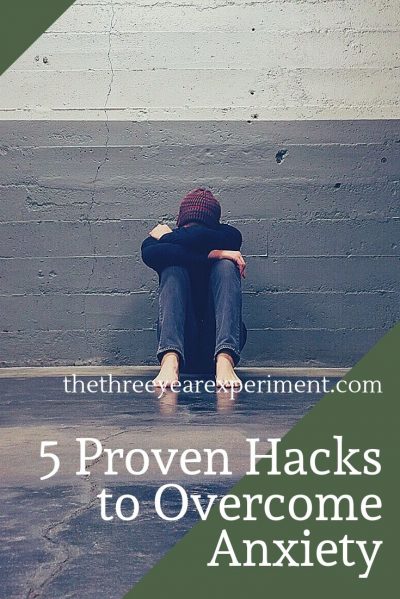This is the time of year when anxiety tends to dip down in our house, because it’s the end of the school year, summer’s approaching, and everything’s a bit more relaxed. That’s the best time, in my opinion, to brush up on some strategies for managing anxiety. When my family’s anxiety is well-managed, everything else, including money management, work, and school, is so much easier.
There’s nothing worse than that creeping dread–anxiety–that steals in and leeches all the joy and excitement from life. Mr. ThreeYear suffers from anxiety, and so do several more of my family members, including both my sons. So we have lots of practice in how to overcome anxiety.
Anxiety is genetic, and I’ve learned that the anxiety gene is powerful. It got passed down to both of my kids, even though I have relatively little anxiety myself. But once you’re aware of it, it becomes very clear who in your family suffers from it. It took me awhile to figure out why Mr. ThreeYear was always so wigged out when we took the boys for a walk around the block. “Careful!” he would yell to the boys as a car rolled by at 15 mph 500 yards from us. “They’re on the side of the road and we’re surrounding them,” I would say. “Even if that car managed to light on fire and fly through the air past us, it would still miss the kids.” Somehow those types of comments didn’t help. And my own feelings about taking a walk soon changed–it was no longer fun, it was torture.
One of the best articles I’ve ever read on how to overcome anxiety (or just live with it) is written by Scott Stossel in The Atlantic. It’s a long read, but is an excellent primer on what it feels like to live with debilitating anxiety. I have used this mega guide of his and adapted some of the methods or ticks to my family with varying success. Over the years, we’ve experimented with lots of different ways to overcome the anxiety and overarching fear, the low-level worry that eats away at your ability to focus and find joy in any activity. Some worked and some didn’t. Here are our five proven hacks to combat anxiety in our family. They’re tried. They’re true. They work.
Exercise
Without a doubt, exercising is the number one way to overcome or at least ease anxiety. We have seen it over and over again at our house. Unfortunately, according to the American Psychological Association, psychologists have been slow to study the mental health benefits of exercise. There are scant studies showing the effects of regular exercise on anxiety disorders or OCD. However, one study done by Princeton University and reported by the New York Times sheds light on how our body adapts to stress, after long-term training, by creating new neurons that produce GABA, a neurotransmitter which inhibits brain activity. The study found that the active mice felt just as much anxiety initially as non-running mice, when exposed to stress, but were soon calmed by their new neurons, designed to quiet the brain. It turns out that when we’re able to turn down our monkey brains, we can turn down our screaming anxiety, too, creating a calmer, less tense mental space for ourselves.
But how in the world to get to the gym when your anxiety is sky high? It’s the last thing you want to do.

The key is not to exercise when your anxiety is super high. It’s to exercise every single day and make it a habit, so when a bout of extreme anxiety hits, you’ll be so conditioned to work out, you’ll do it anyway.
The way to develop a new habit is really to make yourself. I have some experience with this myself, being a very lazy and undisciplined lay-around, underneath my put-together blogger exterior. One of my habit goals for this year is to get up every morning and run on the treadmill, just ten minutes, to get myself in the habit of running everyday (I currently only run outside with my running partner about 2-3 times a week). We’re now two-thirds of the way into January, and you know how many times I’ve gotten up to run on the treadmill? Once.
But here’s the thing: I’m not giving up. I’m not berating myself (okay, I am, a little). I’m just thinking about ways to trick myself into doing it. Currently, I’ve got my alarm set for 5am. But I hit snooze twice, and then by that time, I feel like it’s too late to get my clothes on and head down to the basement to run, because I’ve got writing to do. So this morning, I put my alarm and my running clothes across the bedroom, and when my alarm rang, I had to get up out of bed and go turn it off. It was enough to get me up and start putting my running clothes on, which I’d laid out the night before. No snooze button hit. Running done. Success. Now I’ll rinse, and repeat, tomorrow. And if I fail again, I’ll just keep trying.
I’m going to keep at the habit until I acquire it, even if it takes months. Because once it’s a habit, I’ll be doing it for the rest of my life. It took Mr. ThreeYear a while, but he finally figured out how to incorporate regular exercise into his day. He bought a gym membership, which isn’t cheap, and he goes every weekday after work. He spends 30 minutes working out, and 30 minutes lifting weights. It means he gets home about an hour later than he used to, but I try not to complain, because he is so much calmer and less anxious in general.
It doesn’t matter what kind of exercise you do or how you do it. The key is consistency. If you’re a skier but you can get out every afternoon on the slopes, go for it. I know road bikers who run in the winter (here in New Hampshire, which is craaaazy talk), while they’re not able to cycle. But they’re consistent with their training, winter and summer.
Imagine the worst case scenario
This is one of the most effective short-term hacks for anxiety that I know. If your anxiety is just sky-high, talk it through with a friend or loved one. When Mr. ThreeYear and I have these conversations, they usually go like this:
Him: I’m super anxious about flying this week.
Me: What’s the worst that can happen?
Him: I could die.
Me: Yes, you could, that’s true. But what’s the likelihood of that happening?
Him: Low.
Me: Very low, less likely than a car accident. What are you really worried about?
Him: I’m worried that I’m going to feel terrible on the flight, and spend the entire flight feeling sick with worry.
Me: Yep. That feeling stinks. What strategies could you use to help you when you start to feel like that?
PS: Although I’ve painted myself to sound like the wise and helpful wife, there were years when I would yell at him to just calm down. That strategy is decidedly ineffective. Anxious feelings are real, and you can’t shut them down by brushing them away like an annoying fly. But when you poke and prod at them as if you’re dissecting something in science lab, they shrink under the glare of examination. When you speak your worst fear aloud, it becomes a little less scary.
Talking about fear rationally, and understanding that gurgling in your stomach, does help you use your rational brain to soothe your irrational brain.

When our anxiety spikes, we have an amygdala hijack. Your irrational amygdala is shutting down your rational pre-frontal cortex, so you’re momentarily incapable of rational thought. Your most ancient, animal brain is shooting you full of cortisone and fear. Your job, or your partner’s job, is to stop the hijack by bringing you back to a rational place, by giving you the tools to start using your pre-frontal cortex again. Talking through the worst-case scenario is one way to do that.
Remember the past -how you’ve made it through hard times before
Remind yourself that you have felt anxious before and survived. I understand that if you’ve ever had a panic attack (which I haven’t), it feels like you’re dying and is one of the worst experiences to go through, because you feel so out of control and in pieces. Mr. ThreeYear and my sister have both had panic attacks before. Cait Flanders describes a panic attack in her new book, The Year of Less (that’s an affiliate link just so you know–the book is incredible). It was so bad that she actually got out of her car and lay down on the side of the road, with her cheek against the concrete.
I know it sounds counter-intuitive to think about a panic attack, but you need to remind yourself that you’re not, in fact, going to die. If you’ve experienced these emotions before you need to talk yourself through the amygdala hijack again and remind yourself that even though you feel terrible, the feelings will pass. They’re temporary.
If the anxiety isn’t quite at a panic-attack level, then this strategy is even more effective.
“I was worried about flying before and it felt terrible. I had a bad flight. I got off the flight and felt wrecked. But we didn’t crash. I drove home and saw my family. I made it.”
I occasionally sing in public places and I do suffer from anxiety when I sing or present to crowds. I’ve used this strategy to remind myself that even if I’ve gotten visibly nervous, people still appreciated what I had to sing or say. I have made it through the humiliation of messing up in public. I’m human. We mess up sometimes. People appreciate that and feel closer to you. (I’ve also learned to take beta blockers. No more shaky speech. Very effective. See the last tip for more there).
When the boys are anxious about school or a test, we use this strategy a lot. “How did you do when you took this test last year?” “I did good, but what if I do terrible this time?” “Okay, you did good. How did you feel when it was over?” “Relieved.” “Okay, remember that feeling of relief. You’re going to be feeling it soon. You’re going to feel anxious, take the test, probably do well, then feel lots of relief.”
It also helps to remind them, “You’ve felt this much anxiety before about something, but you pushed through it and did it anyway. That’s because you’re really strong. You’re stronger than your fear.”
That’s a corollary to acknowledging the past–you can rewrite your narrative to remind yourself how anxiety has actually helped you get stronger. “I’m feeling anxious, but this experience is helping me grow and will make me stronger next time I feel this way.” Speaking such words out loud is powerful, too, because then you hear them and are more likely to internalize them. You can practice speaking in a loud, powerful voice, to help you feel stronger and more powerful than you actually do.
Acknowledge your emotions
We have a saying in our house:
The only way around fear is through it.
The kids know that if they’re scared of something, they need to acknowledge that it makes them feel anxious or fearful, and then push through it and do it. People with anxiety avoid situations that make them anxious, which is a natural response to such feelings. But the only way we teach and train our brain to not have anxious feelings in a certain situation is to slowly acclimate to it.

When my sister was in kindergarten, she developed an almost crippling anxiety around drop-off. She was terrified my dad would leave her, she would become lost, or he or my mom would never be back to pick her up. So he practiced slowly acclimating her to the drop-off process. On Day One, he walked her all the way in to her kindergarten class, then stayed ten minutes. On Day Two, he walked her in and stayed five minutes. On Day Three, he walked her to the door of her classroom but didn’t come in. This went on for several weeks until he was finally able to let her out at the car line and she could walk in herself.
Acknowledging your feelings is powerful, because sometimes you don’t realize that anxiety is making you think irrationally. When I began to point out to Mr. ThreeYear that it was anxiety that was making him feel so unsafe on our walks, and that his behavior was not in-line with the actual danger the kids were facing, he began to calm down and relax a bit more on our walks.
Acknowledging your feelings doesn’t always change your feelings, but it can remind you to act a different way. “I’m feeling super anxious right now. I need to stop and focus on my breathing for ten minutes.”
We also acknowledge the benefits of having anxiety in our house. People who suffer from high levels of anxiety tend to be very in-tune with other people’s emotions, and tend to think of others more. Both my older son and my husband are extremely thoughtful, caring individuals, who are quick to apologize or clarify if they feel they’ve said something that might hurt my feelings. They always ask about my day and how I’m feeling and have tons of empathy. Anxiety helps people think about the future and therefore prepare well for it, many times.
It can be debilitating, but it also has its benefits. We try to acknowledge the good and work through the bad.
Don’t numb, but get medical help.
People with severe anxiety will try anything to get that feeling to go away. Anxiety feels terrible–you just want it to be over. But using substances like alcohol, Xanax, or marijuana or other drugs to numb your anxiety has the decidedly negative benefit of numbing the rest of your feelings, too. Plus, these substances are highly addictive, and in the long run make you feel worse. There’s nothing like the anxiety after a night of drinking or drugs when you don’t remember what you said or did.
As I tell the kids all the time, you’ve got to feel your feelings and get through them, because otherwise you’ll never be able to grow and work through the anxiety.
That being said, we have modern medical interventions that can help as one part of a strategy of managing your anxiety. When you work with a doctor to find the right anxiety medication, it can make a big difference in managing your anxiety, especially when you combine it with some of the strategies listed above, like exercise.
The key is knowing it will take time to find the right medicine and dosage. The first one or two medicines you try may not work, but the key is not to give up, but try another medication. Anxiety meds take a long time to build up and work in the body, so it is a several-month process. You can’t ever “cold turkey” stop taking a medicine, because then you might have some serious side effects. Giving the medicine time to build up and wear off will take weeks or months, but in the overall scheme of your life, that’s no time at all.
Sometimes, when you have specific phobias or fears, your doctor can give you a small amount of a drug, like Xanax, that works as a numbing agent in the moment you’re feeling the most panicked. Most of the time, you get one or two pills. Sometimes, even having the medication without taking it is enough to help stop the panicky feelings of flying or whatever other phobia you have. Sometimes, remembering how you felt when you took the Xanax overrides the memory of the feelings of anxiety, and you “re-write” your feelings for a certain experience, like flying. “Oh,” your brain now says, “I remember last time I did this activity. I don’t need to feel anxious, because this isn’t a dangerous activity. I felt really peaceful last time I was in a plane.”
Bonus Strategy: Put Down Your Phone
We keep seeing new studies that spending lots of time on social media makes us more, rather than less, anxious. Although we feel like we’re connecting with friends when we’re on Facebook and Instagram, research has shown these behaviors increase our loneliness and depression, as well as general anxiety levels, because we’re engaging in what some have described as faux-social connections. It feels like we’re making connections with friends, and the same pleasure centers light up in the brain for a moment or two, but the long-term increase in happiness and well-being that face-to-face interactions provide aren’t there.
The more we’re on social media, the less likely we are to actually be spending time and making memories with friends and family.
When I recently gave up social media for a month, I noticed that not only did I feel less overall anxiety and FOMO, I had a clearer head. If you find yourself spending a lot of time attached to your device, you may consider a similar experiment.
So there you have it. These are the five hacks we’ve used time and time again to combat our household’s sometimes high-levels of anxiety. We’re currently at a very good place in managing our anxiety, with what I feel is a good balance of pharmaceuticals, exercise, and other coping strategies in place. But we know that anxiety can spike anytime, so we’re ready with these additional strategies to work through those feelings and come out stronger on the other side.
What about you? Do you have any advice or experiences with anxiety to add? I’d love to hear your thoughts!



This is so key, Laurie! Thank you for sharing! I find myself often going through “what-ifs” to calm my nerves when I get anxious about something. What if the worst case scenario happened? Well, we’ll figure it out! 🙂 It certainly helps to reset the “anxiety response” at times.
And exercise… I swear that is my remedy for almost anything!
I agree, Mrs. AR! If it weren’t for running, I’d be a basket case!! 🙂 (Okay, maybe I should say “more of a basket case”!).
Hey Laurie, I did not see one of the best books in the world in the list : How to stop worrying and start living by “my friend” Dale Carnegie! 🙂 This has been a great help for me and I have given it to my dad as well.
I love Dale Carnegie, but I’ve never read that book! I will have to check it out. Thanks for the tip, because it will probably be great for Mr. ThreeYear as well!
it’s been a few months since i recovered from anxiety,and i can say that if my past self were to need some hacks i would have made her read your blog,it’s totally relatable.I’d love for you to check out my blog too,because i write about things pretty similar to yours.lots of love!
I’m so glad you’re doing better! My family tends to go in waves with anxiety–sometimes worse, sometimes better. But we do try and have less and less overall anxiety in our days as time goes on. I’ll definitely check out your blog!
Ohhh yes, totally relate. My anxiety has gone way up this year based on some intense changes in my personal life. My assistant teaching job, that I used to be pretty good at and find really easy, this year has invoked unprecedented anxiety levels. It helps if I tell myself before I go- “today, you’re going to feel shaky and nervous, and that’s okay.” Because later when the tough moments strike, I’ve already trained myself to remember that my physical symptoms are normal and what I was expecting. I’ve also pinpointed some of the reasons I feel the way I do, and that deflates some of the worry I experience.
Ughhh, frustrating to live with though.
I’m sorry you’re having to live through it! But I do the same thing, especially with highly stressful things like job interviews. I tend to get quite nervous and shaky. Drives me nuts, but it’s life. I hope your job situation gets better and hopefully you have a nice summer off!